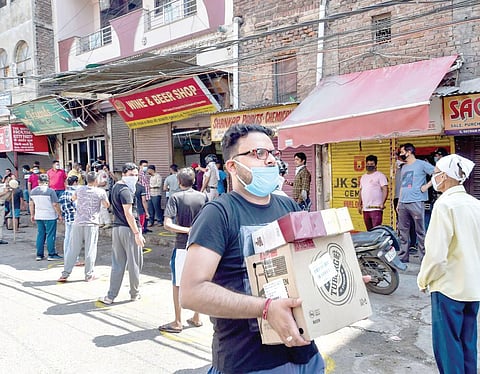

Liquor, wine and beer manufacturers across Delhi-NCR and beyond, have been rallying for home delivery of alco-bev products as the recent localised lockdowns are presumed to remain in place for the near future given the crescendo of cases that has swept up the Capital. Since restaurants and bars have been shut for dine-in for much of the last month, and alcohol shops are not essential in the strictest sense (never mind your need for a drink when you hear the latest Covid figures), vintners, brewers, and distillers are unable to sell their wares, creating a glut of supply for which there is unable to be a demand due to government-mandated closures.
So what is a beleagured industry to do? “The most obvious step is liberalising home-deliveries for alco- bev products. Around the world, online sales is one of the most successful channels because it opens up accessibility for everyone and also keeps information transparent,” says Anand Virmani, CEO, Cofounder and Distiller at NAO Spirits, which owns high-end Indian gin labels like Greater Than and Hapusa. “At this time especially, when you do not want to promote people congregating in one place, I would think online shopping would be the ideal solution,” he adds.
Ashu Ratan Khare, Director of Delhi-based Rock & Storm Distilleries, whose company has a portfolio of 11 brands and earned over Rs 2,500 crore in sales in the last five years, does the math. “We do around 25 crore in sales every month, which earns significant revenue for the government through taxation. We are only one company so you can imagine the total revenue the governments are missing out on due to a lack of sales.” And before you start getting lachrymose over the losses of liquor, consider the bitter lot of beer.
“Beer is a product of fermented grain wherein the shelf life and manufacturing process are different than that of IMFL. Spirits do not have a definite shelf life and can be kept for a longer period of time. On the other hand, brews that are stocked in warehouses might expire and lose a relevant amount of shelf life, while stuck in storage and in the production phase,” points out Shifa Rastogi, Brand Manager, Kimaya Himlayan Beverages that manufactures Bee Young and Yavira Beer. She continues, “When the products ready to be dispatched and held at different stages of the supply chain are subject to VAT and duties, it leads to an enhanced cost of production without any set-off benefit of input taxes.
We have already booked massive losses last year during the lockdown. The redemption of duties at various levels in a state can be a great step and help for the young players in the industry.” Rohan Khare, Founder, Bad Monkey Beer, recalls, “Last year Delhi introduced a token system, wherein consumers were issued tokens for a nearby shop with a specific date and time slot, to maintain social distancing and comply with other norms. The token system was a partial success, but the government withdrew it in a couple of months, after lockdown, as a lot of consumers violated the system.
The system could be visited again with better implementations and updated systems, in order to maintain social distancing norms and state revenue, at the same time.” Rastogi, meanwhile, suggests allowing retailers to open in a staggered manner, noting, “The stocks retained at various levels of the supply chain should be allowed to release towards the next stage in a controlled manner.” According to industry insiders, the mechanism for home delivery can be easily put together in today’s time. This will really help the businesses since there is an immense demand for alcoholic beverages during the lockdown.
Online delivery will inflate the revenues for the distributor, manufacturer, and state government. Finally, there is the human cost. Returning to Rock & Storm Distilleries, Ashu Khare says his business employs a total of 250 workers, of whom 100 are regular salaried employees who are still getting paid every month, despite production having been shut.
“But we would also employ around 150 labourers on a daily wage basis. With our facilities shut we have no jobs for them, which means a loss of income for them and hardships for their families. We were paying these daily wage-earners between Rs 12-15 lakh a month, depending on our production needs, and as the workers don’t have their daily incomes to spend on necessities anymore, all that money is out of circulation from the economy. So everyone is losing.”